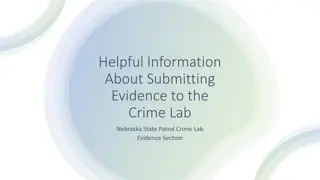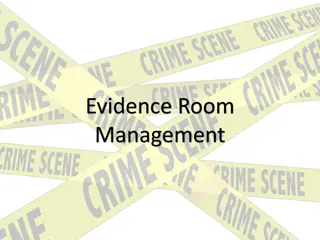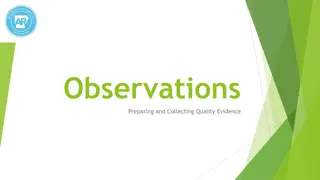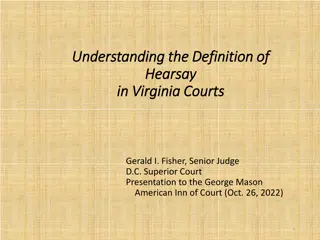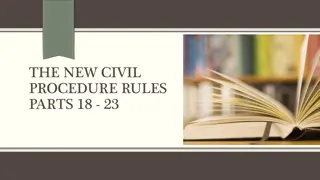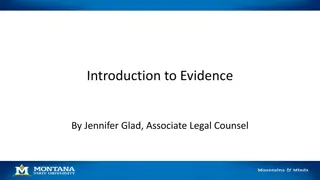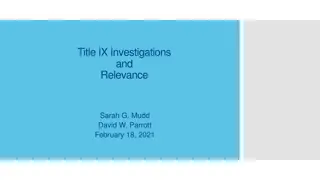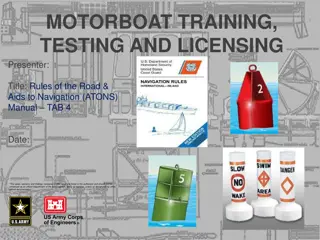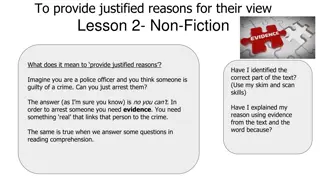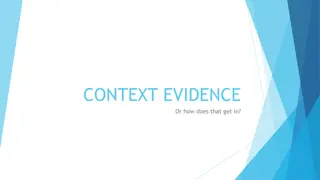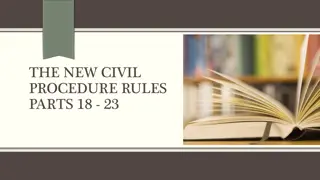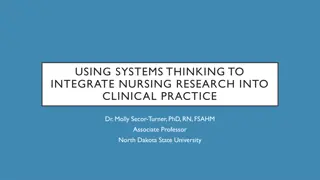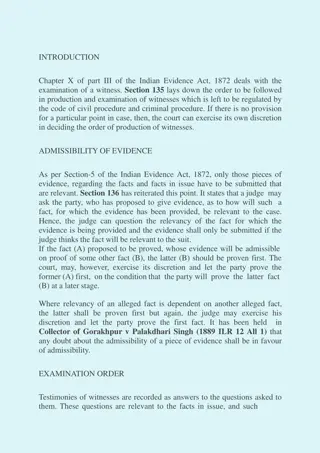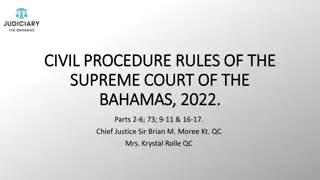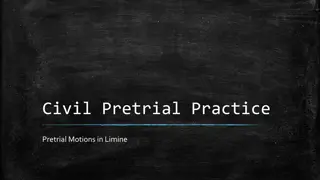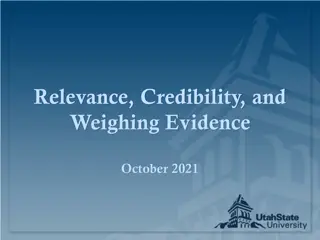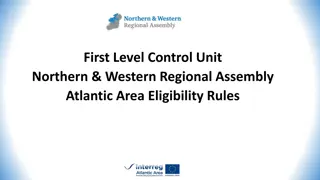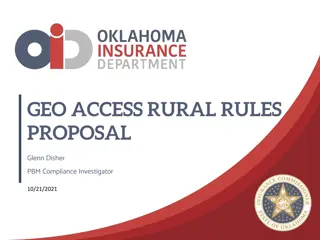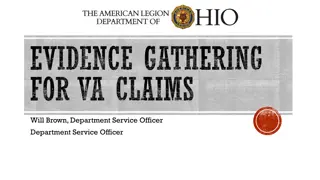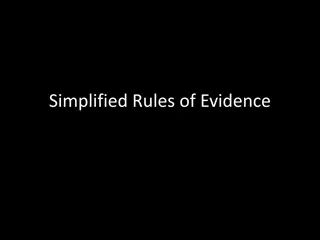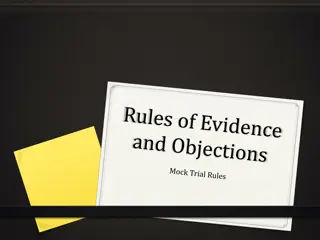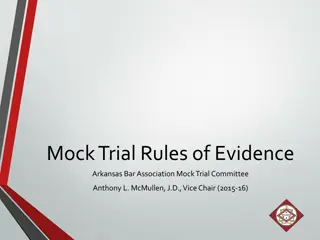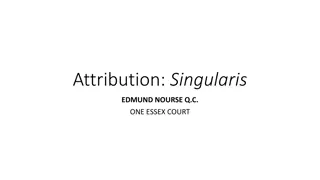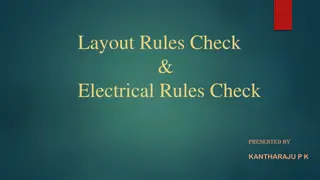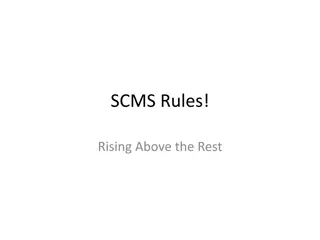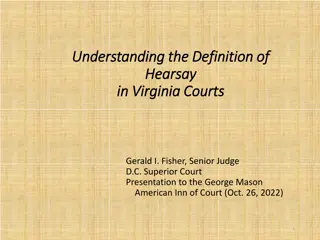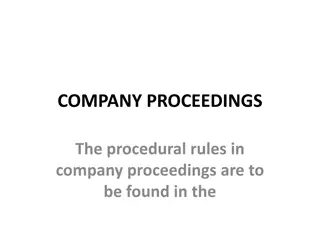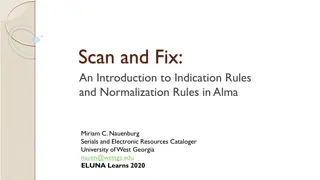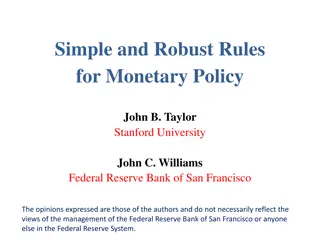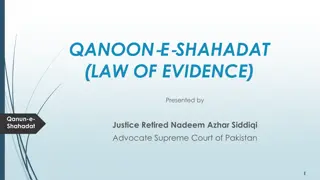The Role of Artifacts and Evidence in Educator Evaluation and Support
Exploring the role of artifacts and evidence in educator evaluation, this content covers the three categories of evidence required by the Oregon Framework. It delves into the efficient process that reduces redundancy, essential components of SLG goals, and the types of evidence relevant to professio
0 views • 15 slides
Understanding Impression Evidence Collection in CSI Investigations
Impression evidence plays a crucial role in investigations, including shoeprints, tool marks, tire tracks, bite marks, and riffling marks on bullets. This evidence can be collected in 2D using photography or tape lifts, and in 3D through casting methods. Differentiating between class and individual
0 views • 21 slides
Helpful Information About Submitting Evidence to the Crime Lab.
Helpful information about submitting evidence to the Nebraska State Patrol Crime Lab's Evidence Section. Learn about the NSP 750 Evidence Submittal Form, submission process, and guidelines for resubmissions. Ensure all necessary details are provided for proper analysis of evidence.
5 views • 16 slides
Illegally obtained evidence
Illegally obtained evidence refers to evidence acquired through unlawful means, such as searches without warrants or extraction under duress. The Fruit of the Poisonous Tree doctrine renders evidence inadmissible if derived from illegally obtained evidence. The Exclusionary Rule prohibits the use of
2 views • 30 slides
Evidence Room Management
Explore the intricacies of evidence room management in a law enforcement setting, including the roles of individuals like Greg Van Buskirk, differences in crime scene management between large and small departments, the distinction between property and evidence, the importance of maintaining chain of
0 views • 8 slides
Enhancing Evidence Collection in Education
Explore the importance of minimizing bias in evidence collection, review different types of evidence, identify strategies to collect quality evidence effectively, understand common biases affecting assessment, and learn to spot and address biased statements. Practice eliminating biased language and
0 views • 11 slides
Understanding the Definition of Hearsay in Virginia Courts by Gerald I. Fisher, Senior Judge
Preliminary principles and rules regarding hearsay in Virginia courts, including the effective date of the Virginia Rules of Evidence, application of rules in various trial scenarios, criteria for admissibility of evidence by trial judges, and reasons for the legal distrust of hearsay evidence. The
1 views • 78 slides
Understanding Civil Procedure Rules Parts 18-23
The new civil procedure rules cover various aspects such as counterclaims, additional claims, changes to parties, representative parties, miscellaneous rules, and rules regarding minors and patients. The overriding objective is to ensure cases are dealt with justly and at a proportionate cost, consi
1 views • 49 slides
Understanding Evidence in Investigations
Learn about the principles and types of evidence in investigations, including inculpatory and exculpatory evidence, physical, documentary, demonstrative, and verbal evidence. Explore sources of evidence and the significance of collecting relevant information to ensure a fair investigative process.
0 views • 14 slides
Understanding Title IX Investigations and the Role of Evidence Collection
The purpose of a Title IX investigation is to collect relevant evidence, both inculpatory and exculpatory, to allow for impartial decision-making regarding reported sexual harassment cases. Parties involved must receive sufficient notice and have opportunities to participate, present statements, and
1 views • 32 slides
Motorboat Training, testing, and licensing: Rules of the Road & Aids to Navigation Manual
This presentation covers essential information on motorboat training, testing, and licensing, focusing on rules of the road and aids to navigation. It includes details on navigation rules, the importance of following them to prevent accidents, and where the rules apply. The content also explains who
0 views • 34 slides
Providing Justified Reasons in Reading Comprehension
Providing justified reasons in reading comprehension involves using evidence from the text to support one's answer, similar to presenting evidence in a legal case. Just as a police officer needs evidence to make an arrest, readers need textual evidence and the word "because" to support their respons
0 views • 11 slides
Understanding Context Evidence in Legal Proceedings
Context evidence in legal proceedings refers to evidence of acts not charged in the indictment, used to provide a background for understanding specific allegations. This type of evidence is often relied upon by the prosecution to explain events or behaviors that may seem isolated or surprising. It i
1 views • 13 slides
Understanding the New Civil Procedure Rules Parts 18-23
The new civil procedure rules cover various aspects like counterclaims, addition of parties, changes to case statements, representative parties, miscellaneous rules about parties, and rules regarding minors and patients. The overriding objective is to ensure cases are dealt with justly and at a prop
3 views • 49 slides
Integrating Nursing Research into Clinical Practice with Systems Thinking
Dr. Molly Secor-Turner emphasizes the importance of evidence-based practice (EBP) in nursing. EBP, derived from rigorous research, leads to quality patient outcomes by aligning services with current knowledge. The process involves identifying problems, critiquing evidence, implementing recommendatio
0 views • 21 slides
Examination of Witnesses under Indian Evidence Act, 1872
Chapter X of Part III of the Indian Evidence Act, 1872, outlines the process of examining witnesses, including the order of production and admissibility of evidence. Sections 135 to 141 delve into the rules governing the examination-in-chief, cross-examination, and re-examination of witnesses, empha
2 views • 8 slides
Civil Procedure Rules of the Supreme Court of The Bahamas, 2022
The Civil Procedure Rules of the Supreme Court of The Bahamas, 2022 detail the application of CPR to civil proceedings, highlighting exceptions, the Woolf Reforms, and key provisions such as active case management and the overriding objective. The rules also address proceedings commenced before the
2 views • 30 slides
Understanding Pretrial Motions in Limine in Civil Pretrial Practice
Pretrial motions in limine (MIL) play a crucial role in civil pretrial practice by seeking evidentiary rulings in advance to control the introduction of evidence at trial. These motions aim to prevent the admission of irrelevant, inadmissible, or prejudicial evidence and can also facilitate the intr
2 views • 17 slides
Understanding Evidence-Based Medicine and Clinical Decision-Making
European Patients Academy on Therapeutic Innovation emphasizes the importance of Evidence-Based Medicine (EBM) in providing optimum clinical care. EBM involves systematic review and utilization of clinical research for informed decision-making, benefiting patients in disease management and treatment
7 views • 20 slides
Understanding Relevance, Credibility, and Weighing Evidence in Decision-Making
Explore the importance of relevance and credibility in evidence assessment, the role of hearing panels in evaluating evidence fairly, and the responsibilities they hold. Learn about presenting relevant evidence, policy analysis, and identifying irrelevant evidence to ensure a thorough review process
6 views • 32 slides
Financial and Eligibility Rules for EU Cooperation Programmes
Financial and eligibility rules for EU cooperation programmes include details on the first-level control unit, sources of information, hierarchy of rules, overarching eligibility rules, and reporting overview. These rules cover areas such as project activities, expenditure eligibility, procurement r
2 views • 27 slides
Mastering Claims, Evidence, and Warrants for Persuasive Writing
Understanding the concepts of claims, evidence, and warrants is crucial for constructing persuasive arguments. Claims represent positions to persuade, evidence supports claims with facts, and warrants bridge the gap between evidence and claims. An exercise is outlined to help practice forming claims
0 views • 8 slides
Rural Access Compliance Rules Proposal by Glenn Disher - PBM Investigator
Proposal by Glenn Disher, a PBM Compliance Investigator, outlines rules for rural access compliance. The proposal focuses on considering local conditions and enforcing rules for maximum impact. It includes recommendations for zip code rules, compliance mileage rules, and examples of non-compliant ru
0 views • 7 slides
Understanding Biased Assimilation and Attitude Polarization in Social Disputes
People with strong opinions on complex social issues tend to interpret evidence in a biased manner, accepting confirming evidence readily while subjecting disconfirming evidence to critical evaluation. This can lead to increased polarization rather than narrowing of disagreement when exposed to the
0 views • 20 slides
Transformation of Quality Assessment Framework in Healthcare
The healthcare quality assessment framework is evolving with a new strategy focused on data-led, people's experiences, care integration, and safety culture. The current framework is transitioning towards a new approach by late 2023, incorporating separate registration and monitoring processes, five
0 views • 14 slides
Understanding Evidence Gathering for VA Claims with The American Legion Department of Ohio
Evidence is crucial for VA claims, and it can come in various forms such as documents, written statements, photos, and video recordings. The framework for evaluating evidence includes factors like relevance, competence, credibility, and weight. Understanding the types of evidence, forms of relevance
0 views • 14 slides
Understanding Simplified Rules of Evidence in Trial Proceedings
Simplified Rules of Evidence outline key principles such as leading questions, narration, relevance, hearsay, opinions, and procedures in a nutshell. Admissibility of evidence depends on arguments as well. Learn how to handle objections effectively to navigate legal proceedings smoothly.
0 views • 35 slides
Understanding Evidence Rules in Legal Proceedings
Evidence rules in legal proceedings serve multiple vital purposes such as ensuring a fair hearing, preventing the waste of time and resources, and excluding unreliable or prejudicial evidence. Various types of questions are discussed, including leading questions, argumentative questions, speculation
0 views • 20 slides
Understanding Mock Trial Rules of Evidence
Mock Trial Rules of Evidence are crucial for determining the admissibility of testimony and evidence in a trial setting. Students preparing for cases need to assess evidence admissibility, make timely objections, and be prepared to defend testimony. The rules cover objections, specific objections ty
0 views • 36 slides
Understanding Company Attribution Rules in Legal Proceedings
Company attribution rules in legal proceedings are outlined, focusing on primary rules found in a company's constitution, general principles of agency, and exceptions where traditional attribution methods may not apply. The interpretation of laws involving companies and the application of specific a
0 views • 7 slides
Layout and Electrical Rules Check by KANTHARAJU P.K.
Layout rules check is essential in preparing masks for fabrication processes to ensure accuracy. Key design rules include minimum width, spacing, enclosure, and extension. Electrical rules checking (ERC) methodology is used to verify design robustness against electronic design rules at schematic and
0 views • 15 slides
School Rules and Expectations at SCMS
This content outlines the rules, expectations, and procedures for students at SCMS, emphasizing responsibility, accountability, and respect. It covers district-wide rules, brave expectations aligned with those rules, common procedures for all students, and specific guidelines for morning routines. T
0 views • 23 slides
Practice and Procedure in Judicial Review: Factual Evidence and Interveners
The content provides valuable insights into the practice and procedure regarding factual evidence and interveners in judicial review cases. It covers general rules, recent cases, applications for oral evidence, questioning witnesses, opinion evidence, and the role of interveners. Key points include
0 views • 28 slides
Understanding Hearsay in Virginia Courts - Key Principles and Rules
Virginia's rules of evidence, particularly regarding hearsay, have specific principles and rules that guide the admissibility of evidence in various trial settings. The presentation by Judge Gerald I. Fisher sheds light on how the court determines the admissibility of evidence, including considerati
0 views • 54 slides
Understanding Time and Value of Supply in VAT Webinar Series
This course note covers the essential aspects of time and value of supply in relation to VAT rules. It explains key rules that determine when VAT must be accounted for and paid, focusing on important regulations impacting vendors. Topics include general time of supply rules, rules for connected pers
0 views • 44 slides
Understanding Procedural Rules in Company Proceedings
Procedural rules governing company proceedings can be found in the Companies Proceeding Rules, Companies Winding-Up Rules, and the Federal High Court (Civil Procedure) Rules. These rules dictate the process for applications, such as Originating Summons, Originating Motion, or Petition under CAMA. Th
0 views • 22 slides
Scan and Fix: Indication and Normalization Rules in Alma
Introduction to indication rules and normalization rules in Alma Miriam C. Nauenburg's presentation on the scan and fix workflow. Learn about creating and applying indication and normalization rules, testing rules in the Metadata Editor, and organizing rules as private or shared.
0 views • 54 slides
Simple and Robust Rules for Monetary Policy Overview
This document discusses the historical background, empirical experience, characteristics of simple rules, robustness, and the comparison between optimal control and simple rules in monetary policy. It explores the evolution of policy rules from Smith and Ricardo to modern approaches, emphasizing the
0 views • 22 slides
Capacity Allocation Mechanisms (CAM) Business Rules Workshop Summary
This summary provides insights into the Capacity Allocation Mechanisms (CAM) Business Rules Workshop held at Ashling Hotel, Dublin on July 2, 2014. The workshop covered topics such as CAM business rules scope, key features, auction processes, code modifications, implementation timelines, and consult
0 views • 32 slides
Understanding Qanun-e-Shahadat: Law of Evidence in Pakistan
Qanun-e-Shahadat Order 1984 replaced the Evidence Act of 1872 in Pakistan, aiming to align the law of evidence with Islamic principles. This law is crucial for judicial proceedings, governing the admissibility of oral and documentary evidence, primary and secondary evidence, and resolving conflicts
0 views • 22 slides


